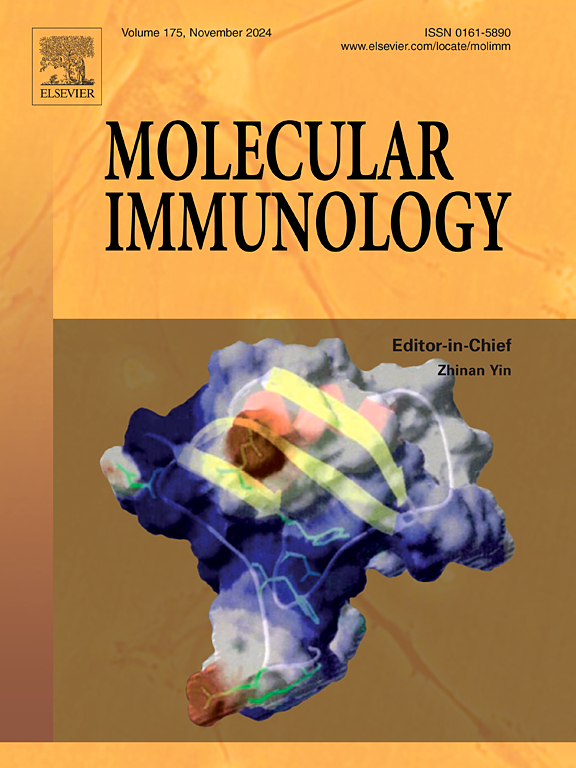CFH无义突变介导的妊娠相关非典型溶血性尿毒症综合征:病例报告
IF 3
3区 医学
Q2 BIOCHEMISTRY & MOLECULAR BIOLOGY
引用次数: 0
摘要
妊娠相关溶血性尿毒症综合征(P-aHUS)的特征是微血管溶血性贫血、血小板减少和急性器官损伤,特别是急性肾损伤,发生在妊娠期间或产后。在大多数报道的病例中,这种罕见的疾病与调节补体系统的基因突变有关。这篇文章介绍了一位38岁的母亲,她在13年后再次生育。剖宫产术后约4天,患者出现严重贫血、血小板减少、肾功能损害和肝功能异常,医生紧急对症治疗。随后的检测显示补体C3水平下降,ADAMTS13抑制抗体阴性,粪便细菌真菌培养阴性。P-aHUS的诊断得到证实,并成功地通过补体阻断治疗使用Eculizumab。补体因子H (CFH)基因的基因测序显示C .3643 C >; T突变(p.a g1215*),表明存在罕见的CFH基因变异,可能与患者的病情有关。这些发现阐明了罕见疾病P-aHUS的临床表现和治疗反应与特定基因突变的关系。我们强调基因检测对准确诊断和个性化治疗的重要性,为未来类似病例的临床管理和研究提供新的见解和证据。本文章由计算机程序翻译,如有差异,请以英文原文为准。
CFH nonsense mutation-mediated pregnancy-associated atypical hemolytic uremic syndrome: Case report
Pregnancy-associated hemolytic uremic syndrome (P-aHUS) is characterized by microvascular hemolytic anemia, thrombocytopenia, and acute organ damage, particularly acute kidney injury, occurring during pregnancy or in the postpartum period. This rare disease has been associated with mutations in genes that regulate the complement system in most reported cases. This article introduces a 38-year-old maternal, who gave birth again after 13 years. Approximately four days post-cesarean section, she developed severe anemia, thrombocytopenia, renal impairment, and abnormal liver function, prompting urgent symptomatic treatment by the doctor. Subsequent detections revealed decreased complement C3 levels, a negative result for the ADAMTS13 inhibitory antibody, and a negative stool culture for bacterial fungi. The diagnosis of P-aHUS was confirmed, and the condition was successfully managed with complement blockade therapy using Eculizumab. Genetic sequencing of the complement factor H (CFH) gene revealed the c.3643 C > T mutation (p.Arg1215*), indicating the presence of rare CFH gene variants that may contribute to the patient's condition. These findings elucidate the clinical manifestations and treatment responses associated with the rare disease P-aHUS in relation to specific gene mutations. We underscore the significance of genetic testing for accurate diagnosis and personalized treatment, offering new insights and evidence for the future clinical management and research of similar cases.
求助全文
通过发布文献求助,成功后即可免费获取论文全文。
去求助
来源期刊

Molecular immunology
医学-免疫学
CiteScore
6.90
自引率
2.80%
发文量
324
审稿时长
50 days
期刊介绍:
Molecular Immunology publishes original articles, reviews and commentaries on all areas of immunology, with a particular focus on description of cellular, biochemical or genetic mechanisms underlying immunological phenomena. Studies on all model organisms, from invertebrates to humans, are suitable. Examples include, but are not restricted to:
Infection, autoimmunity, transplantation, immunodeficiencies, inflammation and tumor immunology
Mechanisms of induction, regulation and termination of innate and adaptive immunity
Intercellular communication, cooperation and regulation
Intracellular mechanisms of immunity (endocytosis, protein trafficking, pathogen recognition, antigen presentation, etc)
Mechanisms of action of the cells and molecules of the immune system
Structural analysis
Development of the immune system
Comparative immunology and evolution of the immune system
"Omics" studies and bioinformatics
Vaccines, biotechnology and therapeutic manipulation of the immune system (therapeutic antibodies, cytokines, cellular therapies, etc)
Technical developments.
 求助内容:
求助内容: 应助结果提醒方式:
应助结果提醒方式:


